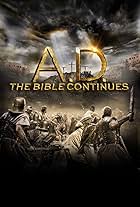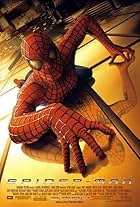Diarmaid MacCulloch, an Oxford history professor, travels to historical points of interest relevant to Christianity discussing the origins and spread of Christianity in a span of 6 episodes.Diarmaid MacCulloch, an Oxford history professor, travels to historical points of interest relevant to Christianity discussing the origins and spread of Christianity in a span of 6 episodes.Diarmaid MacCulloch, an Oxford history professor, travels to historical points of interest relevant to Christianity discussing the origins and spread of Christianity in a span of 6 episodes.
Browse episodes
Featured reviews
The history of Christianity is described superficially, roughly, negligently. An example of this is the story of the spread of Orthodoxy to the east.
The author speaks a lot about Russia.
But the first Khrestians appeared in Bulgaria. In 865, at the time of St. Prince Boris, there is a universal baptism of the Bulgarian people.
Then Christianity came to modern Ukraine. Then it was Kievan Rus. The capital is the city of Kiev.
Prince Vladimir of Kiev was a pagan. Then he chose between different religions for a long time. He even leaned toward Islam. But in chose Christianity. And in 988 he accepted Christianity.
The city of Moscow appeared around 1100-1150. And the Moscow principality began to be formed only after 1277.Three centuries after the baptism of Kiev and Sofia.
The Moscow state was formed in the 15th century AD.
In brief (the abstract): Diarmaid MacCulloch takes viewers on a fascinating journey to churches worldwide providing key links to how these buildings and the people in them relate to the biggest developments in Christianity. It's aiming at a broad audience, and works well.
The full review: Oxford professor Diarmaid MacCulloch makes the complex history behind the world's largest religion approachable and understandable. And, might I add, personal.
MacCulloch's book of the same name ("A History of Christianity: The First 3000 Years") is much more academic than this documentary, as the book is filled with arcane details and sometimes head-spinning depth. The book, for example, delves deeply into the ancient Greek roots of Christianity, but there's none of that here. Instead, he effectively incorporates the strengths of his visual medium while keeping it crisp and to the point, using the clues and cues that church buildings worldwide provide and linking them in fascinating ways to just enough of the many key developments in the history of the Christian church. He does it through passionate narration, extremely short but telling interviews, and lots of kid-friendly analysis.
The music superbly fits the classy and passionate tone MacCulloch sets in his way of speaking and interviewing -- I have a feeling we'll be hearing a lot more from James Atherton and/or Johnny Clifford, the two credited composers.
While I have a few minor quibbles with some of the conclusions MacCulloch draws (he is too broad in his condemnation of the Christian church's response to the Holocaust, for example, when my own grandfather is a typical example of those who stood up against Hitler in the name of Christ -- he was sent to Dachau. Remember that many people even in Germany did not realize the full extent of the death camps, as there was no free press in Germany), the fact that MacCulloch questions, interprets and speculates on the underlying implications of many facets of the story makes it especially entertaining and engaging.
Notably, he is careful about avoiding the jargon that is inevitable in such a documentary and he apologizes for and explains it well when he uses it.
Anyone interested in getting a fair and relatively unbiased view of Christian church history would do well to turn to this TV program -- even preteens with a little parental supplementation. He shows the warts in church history while he admits to having a Christian upbringing himself. But he also confesses to being a "friend of Christianity" vs. an adherent or apologist.
I really love this personal, narrative approach to big events. It's both "his story" and "history".
The full review: Oxford professor Diarmaid MacCulloch makes the complex history behind the world's largest religion approachable and understandable. And, might I add, personal.
MacCulloch's book of the same name ("A History of Christianity: The First 3000 Years") is much more academic than this documentary, as the book is filled with arcane details and sometimes head-spinning depth. The book, for example, delves deeply into the ancient Greek roots of Christianity, but there's none of that here. Instead, he effectively incorporates the strengths of his visual medium while keeping it crisp and to the point, using the clues and cues that church buildings worldwide provide and linking them in fascinating ways to just enough of the many key developments in the history of the Christian church. He does it through passionate narration, extremely short but telling interviews, and lots of kid-friendly analysis.
The music superbly fits the classy and passionate tone MacCulloch sets in his way of speaking and interviewing -- I have a feeling we'll be hearing a lot more from James Atherton and/or Johnny Clifford, the two credited composers.
While I have a few minor quibbles with some of the conclusions MacCulloch draws (he is too broad in his condemnation of the Christian church's response to the Holocaust, for example, when my own grandfather is a typical example of those who stood up against Hitler in the name of Christ -- he was sent to Dachau. Remember that many people even in Germany did not realize the full extent of the death camps, as there was no free press in Germany), the fact that MacCulloch questions, interprets and speculates on the underlying implications of many facets of the story makes it especially entertaining and engaging.
Notably, he is careful about avoiding the jargon that is inevitable in such a documentary and he apologizes for and explains it well when he uses it.
Anyone interested in getting a fair and relatively unbiased view of Christian church history would do well to turn to this TV program -- even preteens with a little parental supplementation. He shows the warts in church history while he admits to having a Christian upbringing himself. But he also confesses to being a "friend of Christianity" vs. an adherent or apologist.
I really love this personal, narrative approach to big events. It's both "his story" and "history".
Details
- Color
Contribute to this page
Suggest an edit or add missing content

Top Gap
By what name was Diarmaid MacCulloch's A History of Christianity (2009) officially released in Canada in English?
Answer








